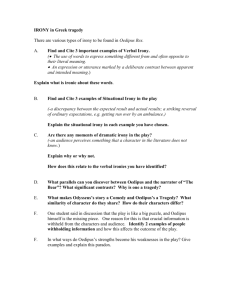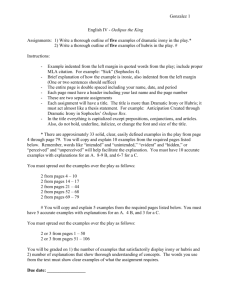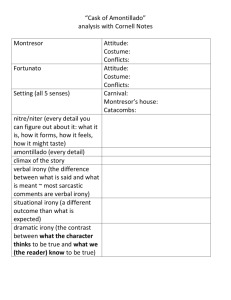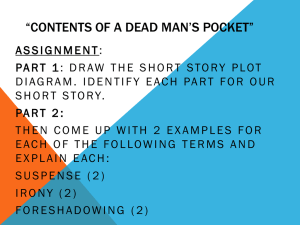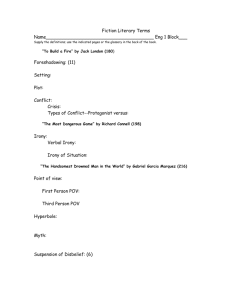Types of Irony works..
advertisement
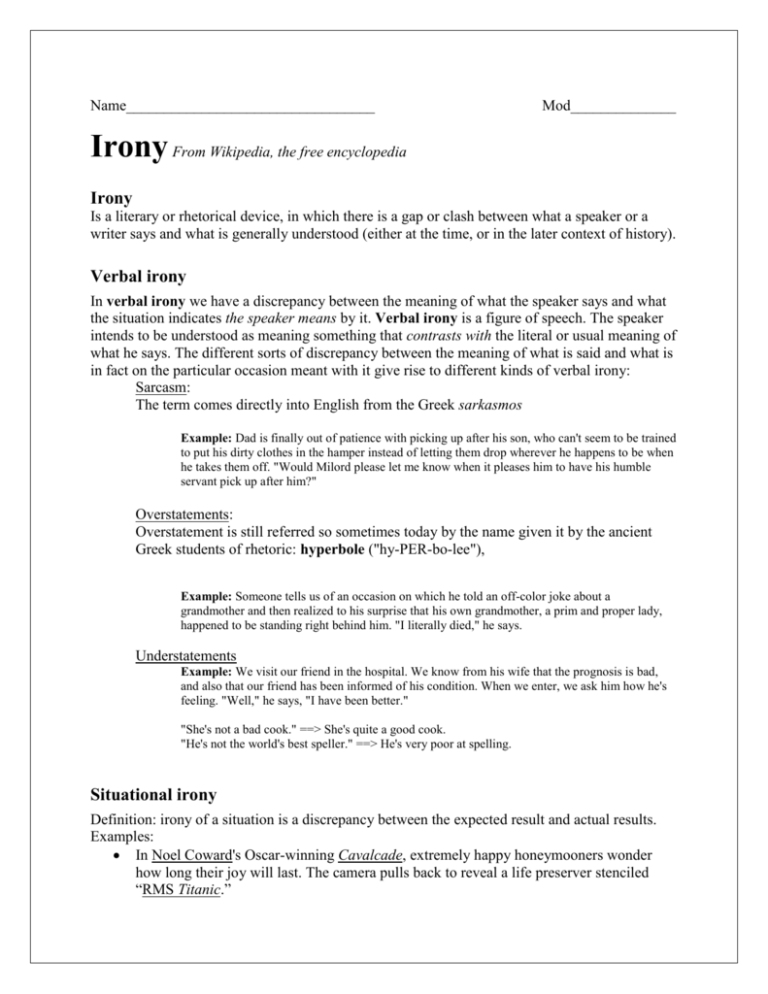
Name_________________________________ Mod______________ Irony From Wikipedia, the free encyclopedia Irony Is a literary or rhetorical device, in which there is a gap or clash between what a speaker or a writer says and what is generally understood (either at the time, or in the later context of history). Verbal irony In verbal irony we have a discrepancy between the meaning of what the speaker says and what the situation indicates the speaker means by it. Verbal irony is a figure of speech. The speaker intends to be understood as meaning something that contrasts with the literal or usual meaning of what he says. The different sorts of discrepancy between the meaning of what is said and what is in fact on the particular occasion meant with it give rise to different kinds of verbal irony: Sarcasm: The term comes directly into English from the Greek sarkasmos Example: Dad is finally out of patience with picking up after his son, who can't seem to be trained to put his dirty clothes in the hamper instead of letting them drop wherever he happens to be when he takes them off. "Would Milord please let me know when it pleases him to have his humble servant pick up after him?" Overstatements: Overstatement is still referred so sometimes today by the name given it by the ancient Greek students of rhetoric: hyperbole ("hy-PER-bo-lee"), Example: Someone tells us of an occasion on which he told an off-color joke about a grandmother and then realized to his surprise that his own grandmother, a prim and proper lady, happened to be standing right behind him. "I literally died," he says. Understatements Example: We visit our friend in the hospital. We know from his wife that the prognosis is bad, and also that our friend has been informed of his condition. When we enter, we ask him how he's feeling. "Well," he says, "I have been better." "She's not a bad cook." ==> She's quite a good cook. "He's not the world's best speller." ==> He's very poor at spelling. Situational irony Definition: irony of a situation is a discrepancy between the expected result and actual results. Examples: In Noel Coward's Oscar-winning Cavalcade, extremely happy honeymooners wonder how long their joy will last. The camera pulls back to reveal a life preserver stenciled “RMS Titanic.” A situation immortalized in O. Henry's story The Gift of the Magi, in which a young couple is too poor to buy each other Christmas gifts. The man finally pawns his heirloom pocket watch to buy his wife a set of combs for her long, beautiful, prized hair. She, meanwhile, cuts off her treasured hair to sell it to a wig-maker for money to buy her husband a watch-chain. The irony is twofold: the couple, having parted with their tangible valuables, is caused by the act to discover the richness of the intangible. When John Hinckley attempted to assassinate President Ronald Reagan, all of his shots initially missed the President; however a bullet ricocheted off the bulletproof windows of the Presidential limousine and struck Reagan in the chest. Thus, the windows made to protect the President from gunfire were partially responsible for his being shot. Rock trio ZZ Top are famously associated with the chest-length beards of guitarist Billy Gibbons and bassist Dusty Hill. The group's drummer, who only has a mustache, happens to be named Frank Beard. A man hops over a giant waterfall e.g. Niagara Falls in a barrel and survives, only to take a cleanup shower where he slips on the soap and dies from trauma. Arnold Schwarzenegger, an actor famous for his violence in film, campaigning against violence in video games in general - which ironically includes those featuring his own characters. Dramatic Irony In literature, a plot device in which the audience's or reader's knowledge of events or individuals surpasses that of the characters. The words and actions of the characters therefore take on a different meaning for the audience or reader than they have for the play's characters. Remember that the Athenian audience came into the theater already knowing the story of Oedipus and his horrible fate. A classic instance of dramatic irony takes place when Oedipus reproaches his brother-in-law Creon, whom he mistakenly but plausibly believes to have conspired to bring him under suspicion of having killed the former king of Thebes in order to have him expelled from the city so as to be able to take over the kingship in his stead. He tells Creon that a man is a fool if he thinks that he can sin against his kinfolk and escape the wrath of the gods. We note that the warning is phrased as a universal: it applies to any person. Oedipus is unaware that he himself has slain his own father (the very same king, no less) and committed incest with his mother. The audience, however, in the moment it hears Oedipus make this declaration, knows (1) the facts about Oedipus' parricide and incest, (2) the fact that Oedipus is unaware of these, (3) the fact that these transgressions will eventually be revealed before all Thebes, (4) the fact that Oedipus will suffer terribly at this revelation, and (5) the fact that the divine order (in virtue of the various prophecies and circumstances of their fulfillment) is firmly implicated both in the commission and the discovery (hence "punishment") of these crimes. It is this discrepancy between what Oedipus understands his words to apply to and what the audience understands their scope actually to be that constitutes the effect the dramatic irony.
